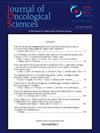The Impact of the COVID-19 Pandemic on Follow-Up and Management of Cancer Patients
Q4 Medicine
引用次数: 0
Abstract
ABS TRACT Objective: This study aimed to evaluate the impact of the coronavirus disease-2019 (COVID-19) pandemic on the follow-up and management of cancer patients. Material and Methods: A survey consisting of 15 questions asking whether there was a delay in follow-up or treatment of cancer during the COVID-19 pandemic was applied to the cancer patients who were admitted to our medical oncology out-patient clinic for follow-up or treatment. Results: A total of 209 cancer patients were included in this study. In 56 (26.8%) patients, there was a delay in the follow-up or treatment of cancer. The delay in cancer treatment occurred in 37 (66%) patients, and the delay in the follow-up of cancer occurred in 19 (34%) patients. The median delay in the follow-up and treatment of cancer was both 30 days (range 1-120) and (range 2-120), respectively. 12.5% of all patients who encountered delays in cancer follow-up or treatment had subsequent cancer-related complications. Also, the delay was significantly higher in quarantined patients and patients diagnosed with severe acute respiratory syndrome-coronavirus-2. In binary logistic regression analysis, living in rural areas and being quarantined due to the COVID-19 pandemic were deter-mined as independent predictors of the delay. Conclusion: The COVID-19 outbreak caused delays in the follow-up and treatment of cancer patients, and acute complications arose due to unavoidable disruptions. To prevent long-term negative consequences of delays in cancer fol-low-up and treatment, it is necessary to adapt the treatments judiciously without sacrificing patient safety and care.COVID-19大流行对癌症患者随访和管理的影响
目的:探讨2019冠状病毒病(COVID-19)大流行对肿瘤患者随访和管理的影响。材料与方法:对我院肿瘤内科门诊住院随访或治疗的癌症患者进行调查,调查内容为:COVID-19大流行期间是否存在癌症随访或治疗延误问题。结果:本研究共纳入209例肿瘤患者。在56例(26.8%)患者中,有癌症随访或治疗的延迟。37例(66%)患者出现癌症治疗延迟,19例(34%)患者出现癌症随访延迟。癌症随访和治疗的中位延迟分别为30天(范围1-120)和(范围2-120)。在癌症随访或治疗中遇到延迟的所有患者中,有12.5%随后出现了癌症相关并发症。此外,在隔离患者和诊断为严重急性呼吸综合征-冠状病毒-2的患者中,延迟时间明显更高。在二元logistic回归分析中,确定农村生活和因COVID-19大流行而被隔离为延迟的独立预测因素。结论:新冠肺炎疫情导致癌症患者随访和治疗延迟,不可避免的干扰导致急性并发症。为了防止癌症随访和治疗延误的长期负面后果,有必要在不牺牲患者安全和护理的情况下明智地调整治疗方法。
本文章由计算机程序翻译,如有差异,请以英文原文为准。
求助全文
约1分钟内获得全文
求助全文
来源期刊

Journal of Oncological Sciences
Medicine-Oncology
CiteScore
0.10
自引率
0.00%
发文量
16
审稿时长
29 weeks
 求助内容:
求助内容: 应助结果提醒方式:
应助结果提醒方式:


